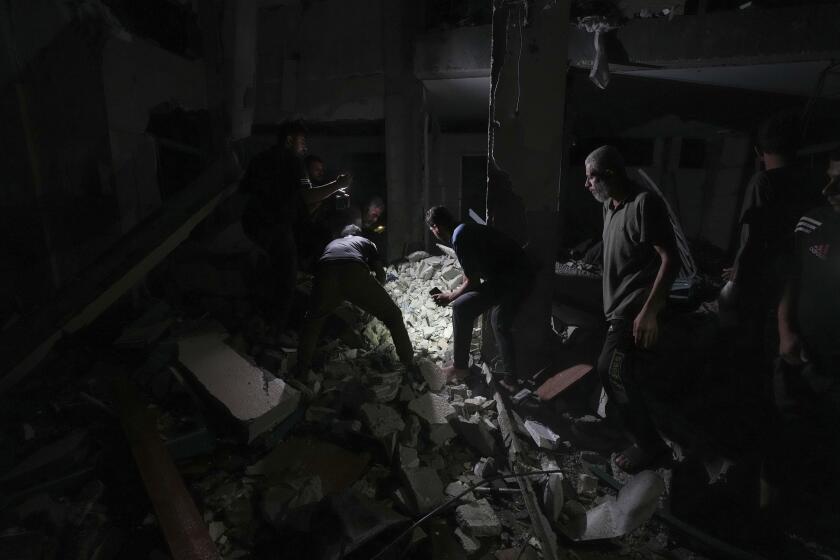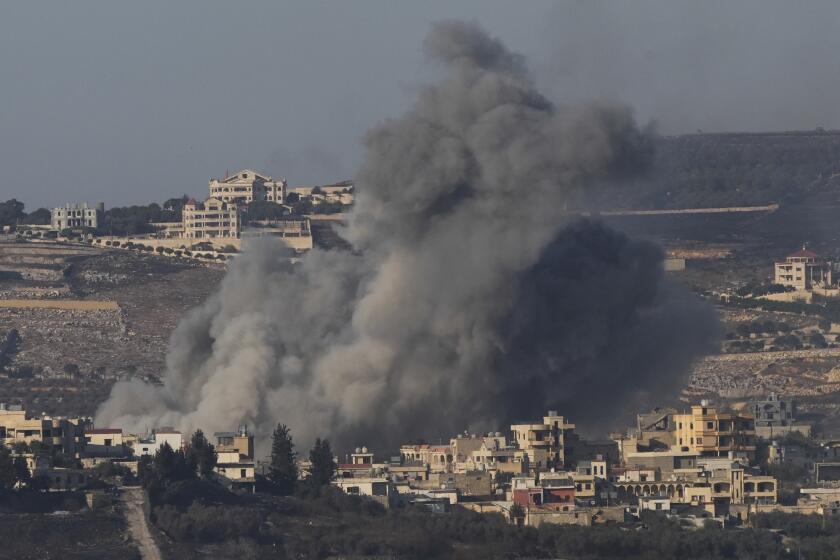Israeli defense minister warns an attack on Iran would be ‘lethal’ and ‘surprising’

- Share via
JERUSALEM — Israel’s defense minister warned Wednesday that his country’s retaliation for a recent Iranian missile attack will be “lethal” and “surprising,” while Prime Minister Benjamin Netanyahu and President Biden held their first call in seven weeks.
In Gaza, a large-scale Israeli operation in the northern part of the Palestinian territory left dozens of people dead and threatened to shut down three hospitals, Palestinian officials and residents said.
The continuing cycle of destruction and death in the Gaza Strip, unleashed by Hamas’ Oct. 7, 2023, attack on southern Israel, comes as Israel expands a weeklong ground offensive against Hezbollah in Lebanon and considers a major retaliatory strike on Iran after Tehran’s Oct. 1 missile barrage against Israel.
“Our strike will be lethal, precise and, above all, surprising. They won’t understand what happened and how. They will see the results,” Defense Minister Yoav Gallant said of the retaliation against Iran, speaking during a visit Wednesday to an intelligence unit. “Whoever strikes us will be harmed and pay a price.”
Iran fired dozens of missiles at Israel on Oct. 1 in an escalation of the conflict between the two countries. Israel has been discussing how to respond to the attack, which the United States helped fend off. Biden has said he would not support a retaliatory strike on sites related to Tehran’s nuclear program.
A year after the Oct. 7 attack that spurred the Gaza war, Israelis and Palestinians reflect. In their voices, they chronicle a devastating day, tragic year.
In northern Gaza, there was heavy fighting in Jabaliya, where Israeli forces have carried out several major operations over the course of the yearlong war and then returned as militants regroup. The entire north, including Gaza City, has suffered heavy destruction and has been largely isolated by Israeli forces since late last year
A rocket fired from Lebanon killed two people in the northern Israeli town of Kiryat Shmona, and six others were stabbed and wounded in the city of Hadera on Wednesday. Police said the attacker was “neutralized,” and later clarified that he had been arrested.
Hezbollah claimed the strike on Kiryat Shmona, saying it targeted “a gathering of enemy forces.” Ofir Yehezkeli, the town’s acting mayor, said the two killed were a couple walking their dogs.
Residents of Jabaliya, an urban refugee camp dating back to the 1948 war surrounding Israel’s creation, said thousands of people have been trapped in their homes since the operation began Sunday, as Israeli jets and drones buzz overhead and troops battle militants in the streets.
“It’s like hell. We can’t get out,” said Mohamed Awda, who lives with his parents and six siblings. He said there were three bodies in the street outside his home that could not be retrieved because of the fighting.
“The quadcopters are everywhere, and they fire at anyone. You can’t even open the window,” he told the Associated Press by phone, speaking over the sound of explosions.
Contrary to critics who say the administration could force Benjamin Netanyahu’s hand, the U.S. has limited power to stop the conflict that began Oct. 7.
Dozens have been killed and survivors fear displacement
Gaza’s Health Ministry said it recovered 40 bodies from Jabaliya from Sunday until Tuesday, and 14 more from communities farther north. There are probably more bodies under rubble and in areas that can’t be accessed, the ministry said.
An airstrike in Jabaliya early Wednesday killed at least nine people, including two women and two children, according to Al-Ahli Hospital, which received the bodies. Strikes in central Gaza killed nine other people, including three children, according to Al Aqsa Martyrs Hospital in Deir al Balah.
Kamal Adwan hospital director Dr. Hossam Abu Safiya said an Israeli strike on tents sheltering displaced Palestinians near the Yemen Saeed hospital in Jabaliya had killed at least 16 people and wounded 17. The casualties were taken to Kamal Adwan.
Jabaliya residents fear Israel aims to depopulate the north and turn it into a closed military zone or a Jewish settlement. Israel has blocked all roads except for the main highway leading south from Jabaliya, according to residents.
The United Nations agency for Palestinian refugees said that it was evacuating seven schools being used as shelters and that only two of eight water wells in the camp are still functioning.
“We are concerned about the displacement to the south,” Ahmed Qamar, who lives in Jabaliya with his wife, children and parents, said in a text message. “People here say clearly that they will die here in northern Gaza and won’t go to southern Gaza.”
Hospitals are under threat
Fadel Naeem, the director of Al-Ahli Hospital in Gaza City, said it had received dozens of wounded people and bodies from the north. “We declared a state of emergency, suspended scheduled surgeries, and discharged patients whose conditions are stable,” he told AP in a text message.
Israel’s offensive has gutted Gaza’s health sector, forcing most of its hospitals to shut down and leaving the rest only partially functioning.
Naeem said three hospitals farther north — Kamal Adwan, Awda and the Indonesian Hospital — have become almost inaccessible because of the fighting. The Gaza Health Ministry says the Israeli army has ordered all three to evacuate staff and patients. Meanwhile, no humanitarian aid has entered the north since Oct. 1, according to U.N. data.
The Israeli military did not immediately respond to requests for comment on the hospitals or the apparent suspension of aid delivery in the north.
Israel is on high alert ahead of memorial events for the Oct. 7 attack, while rallies continue around the world marking the anniversary.
Rear Adm. Daniel Hagari, the Israeli military spokesperson, said late Tuesday that Israeli forces were operating in Jabaliya to “prevent Hamas’ regrouping efforts” and had killed about 100 militants, without providing evidence. Israel says it targets only militants and blames civilian deaths on Hamas because it fights in residential areas.
Israel ordered the wholesale evacuation of northern Gaza, including Gaza City, in the opening weeks of the war, but hundreds of thousands of people are believed to have remained there. Israel reiterated those instructions over the weekend, telling people to flee south to an expanded humanitarian zone where hundreds of thousands are already crammed into squalid tent camps.
The war began just over a year ago, when Hamas-led militants stormed into southern Israel, killing some 1,200 people, mostly civilians, and abducting around 250. They still hold about 100 hostages, a third of whom are believed to be dead.
Israel’s offensive has killed nearly 42,000 Palestinians, according to the Gaza Health Ministry, which does not say how many were fighters. It has said women and children make up more than half of the dead. The offensive has also caused staggering destruction across the territory and displaced around 90% of the population of 2.3 million people, often multiple times.
Israel warns Lebanon it could end up like Gaza
Netanyahu has vowed to keep fighting until “total victory” over Hamas and the return of all hostages.
Christian villages in southern Lebanon thought their neutrality may spare them from violence in the Israel-Hezbollah conflict. Then the evacuation orders came.
On Tuesday, he warned that Lebanon would meet the same fate as Gaza if its people did not rise up against Hezbollah, which began firing rockets into Israel after the initial Hamas attack. That set in motion a cycle of escalation that ignited a full-scale war last month.
“You have an opportunity to save Lebanon before it falls into the abyss of a long war that will lead to destruction and suffering like we see in Gaza,” Netanyahu said, addressing the Lebanese people.
An Israeli strike killed four people and wounded 10 at a hotel sheltering displaced people in the southern Lebanese town of Wardaniyeh on Wednesday, Lebanon’s Health Ministry said.
An Associated Press reporter in a nearby town heard two sonic booms from Israeli jets before the strike. Plumes of smoke rose from the building after the explosion.
In recent weeks Israel has waged a heavy air campaign across large parts of Lebanon, targeting what it says are Hezbollah rocket launchers and other militant sites. A series of strikes killed Hezbollah leader Hassan Nasrallah and most of his top commanders.
The Israeli military said Wednesday that Hezbollah has fired more than 12,000 rockets, missiles and drones at Israel in the last year.
Goldenberg, Magdy and Shurafa write for the Associated Press and reported from Jerusalem, Cairo and Deir al Balah, respectively. AP writers Sarah El Deeb and Kareem Chehayeb in Beirut and Natalie Melzer in Tel Aviv contributed to this report.
More to Read
Sign up for Essential California
The most important California stories and recommendations in your inbox every morning.
You may occasionally receive promotional content from the Los Angeles Times.














